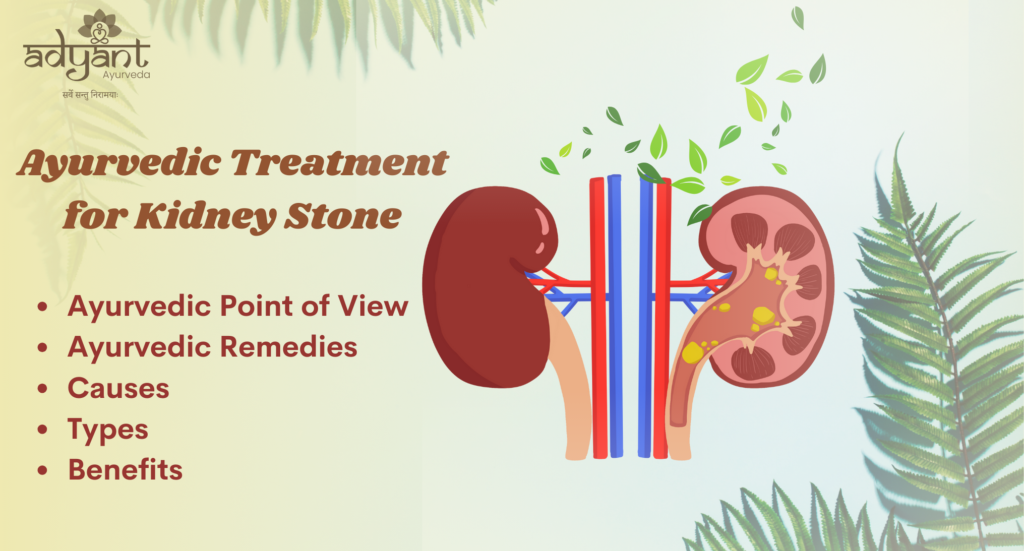Kidney stones, known as Ashmari in Ayurveda, are hard mineral deposits that form in the kidneys, leading to pain, urinary discomfort, and potential kidney damage.
Ayurveda offers natural, safe, and personalized solutions through a combination of herbal remedies, Panchakarma therapies, dietary changes, and lifestyle guidance.
Table of Contents
Toggle🩺 Understanding Kidney Stones in Ayurveda
According to Ayurveda, kidney stones occur due to an imbalance in the three doshas — Vata, Pitta, and Kapha, which leads to Ama (toxin) accumulation and crystallization of minerals within the kidneys.
🔍 Ayurvedic Diagnosis
| Method | Purpose |
|---|---|
| Nadi Pariksha (Pulse Examination) | Detects dosha imbalance |
| Mutra Pariksha (Urine Examination) | Determines stone type and urine pH |
| Modern Imaging (X-ray/USG/CT) | Confirms size, location, and safety for treatment |
💡 Tip: A personalized diagnosis helps tailor therapy, ensuring effective stone expulsion and preventing recurrence.
⚡ Common Causes of Kidney Stones
Dietary: Excess salt, sugar, oxalates, and processed foods
Dehydration: Low water intake increases urine concentration
Lifestyle: Sedentary habits and irregular meals
Genetic Factors: Family history of kidney stones
🚨 Symptoms to Watch For
Severe pain in lower abdomen or back
Painful or frequent urination
Blood in urine (Hematuria)
Nausea and vomiting
Cloudy or foul-smelling urine
💎 Types of Kidney Stones & Ayurvedic Perspective
| Stone Type | Cause | Dosha Imbalance | Ayurvedic Recommendation |
|---|---|---|---|
| Calcium Oxalate | High oxalate foods | Vata & Pitta | Warm, unctuous therapies like Basti |
| Calcium Phosphate | High alkalinity | Kapha & Pitta | Diuretics and mild detoxification |
| Uric Acid | Excess purine intake | Pitta & Vata | Cooling herbs and diet |
| Struvite | Urinary tract infection | Kapha | Detoxifying herbs & hydration |
🥗 Ayurvedic Diet for Kidney Stone Prevention
✅ Include
Hydrating Fruits & Vegetables: Watermelon, cucumber, ash gourd
Alkalizing Foods: Lemon, radish, amla
Herbal Drinks: Coriander water, barley water, buttermilk
🚫 Avoid
High-Oxalate Foods: Spinach, tomatoes, nuts, tea
Processed & Salty Foods: Chips, pickles, canned foods
Excess Dairy & Sugar: Milk, sweets, bakery products
💧 Tip: Drink 2.5–3 liters of water daily to maintain optimal urine flow and prevent stone formation.
🌿 Top Ayurvedic Herbs for Kidney Stones
| Herb | Benefits |
|---|---|
| Gokshura (Tribulus terrestris) | Natural diuretic, supports stone expulsion |
| Varuna (Crataeva nurvala) | Prevents stone formation, enhances urinary health |
| Punarnava (Boerhavia diffusa) | Detoxifies kidneys, reduces inflammation |
| Pashanbheda (Bergenia ligulata) | “Stone breaker,” dissolves kidney stones naturally |
| Shilajit | Strengthens kidney function, prevents recurrence |
🌼 Effective Ayurvedic Formulations
Chandraprabha Vati: Reduces inflammation, supports kidney health
Gokshuradi Guggulu: Flushes stones, prevents infection
Punarnavadi Kashayam: Detoxifies and rejuvenates kidney tissue
Pashanbhedi Kashayam: Supports stone dissolution
🧘 Panchakarma & Ayurvedic Therapies for Kidney Stones
| Therapy | Key Benefits |
|---|---|
| Basti (Medicated Enema) | Detoxifies urinary system, expels small stones |
| Uttar Basti (Urethral Enema) | Clears urinary tract obstructions |
| Kshara Therapy (Alkalizing Treatment) | Dissolves stones, maintains healthy urine pH |
🔄 Treatment Phases
Purva Karma (Preparation): Oleation (Abhyanga) + Steam (Swedana)
Pradhana Karma (Main Therapy): Basti/Uttar Basti (7–14 days)
Paschat Karma (Post-Therapy): Herbal decoctions and dosha-balancing diet
⚠️ Note: Stones larger than 1 cm may require modern procedures like lithotripsy in combination with Ayurvedic therapies for safe removal.
🏡 Home Remedies for Kidney Stones
| Remedy | Preparation | Dosha | Frequency | Benefit |
|---|---|---|---|---|
| 🍋 Lemon & Honey Water | 1 lemon + 1 tsp honey in warm water | Vata & Pitta | 1–2 times daily | Dissolves small stones |
| 🌿 Coriander Seed Water | Soak 1 tsp overnight, boil & drink warm | Pitta & Kapha | Morning | Detoxifies kidneys |
| 🌾 Barley Water | Boil 2 tbsp barley in 2 cups water | Kapha | Daily | Flushes excess minerals |
| 🥥 Coconut Water | Fresh, 1–2 glasses per day | Pitta | Daily | Hydrates, prevents stones |
| 🌱 Ajwain (Carom Seeds) Water | 1 tsp seeds in warm water | Vata | Daily | Breaks down stones |
🌿 Additional Remedies
Ginger Water: Reduces inflammation and pain
Cumin-Fennel Decoction: Promotes urination and dissolving stones
Tulsi (Holy Basil) Juice: Detoxifies kidneys, prevents oxidative stress
💡 Tip: Continue these remedies for 2–4 weeks under Ayurvedic supervision based on stone size and dosha condition.
💪 Lifestyle Tips for Kidney Health
Drink 2.5–3 liters of water daily
Yoga: Pawanmuktasana, Bhujangasana, Dhanurasana for kidney health
Stress Management: Meditation & Pranayama to reduce toxin buildup
Avoid holding urine
Maintain regular physical activity and proper sleep
⚠️ Risks of Ignoring Kidney Stones
Chronic Kidney Disease: Progressive kidney damage or failure
Recurrent UTIs: Bacterial infection risk increases
Severe Pain or Blockage: May require surgical intervention
🌟 Why Choose Ayurvedic Treatment?
100% natural, non-invasive, side-effect-free solutions
Personalized care based on dosha and stone type
Focus on preventing recurrence
Promotes long-term kidney and urinary health
🏥 Consultation at Adyant Ayurveda
If you’re looking for expert Ayurvedic management for kidney stones, visit Adyant Ayurveda, Bangalore’s trusted Panchakarma and kidney care center.
📍 Branches:
Jayanagar | Indiranagar | Kalyan Nagar | Rajarajeshwari Nagar | Bannerghatta Road
👩⚕️ Our experienced Ayurvedic doctors assess your dosha balance, stone type, and kidney function to create a personalized treatment plan that ensures safe, natural, and lasting relief.
📞 Book your consultation now or Call 9972541009 today.
📚 Related Blogs
🌿 Frequently Asked Questions (FAQs) on Ayurvedic Treatment for Kidney Stones
What is the Ayurvedic name for kidney stones?
In Ayurveda, kidney stones are called Ashmari, meaning stone-like hardness.
They are classified into:
Vataja Ashmari: Dry, rough stones with sharp pain
Pittaja Ashmari: Burning pain, blood in urine
Kaphaja Ashmari: Large, smooth stones causing heaviness
Each type requires a customized Ayurvedic approach for effective management.
Can Ayurveda dissolve kidney stones naturally?
Yes. Ayurveda can naturally dissolve and expel small kidney stones through herbs like:
Pashanbheda (Bergenia ligulata) – “stone breaker” herb
Gokshura (Tribulus terrestris) – Diuretic and anti-inflammatory
Varuna (Crataeva nurvala) – Prevents new stone formation
These herbs, combined with a suitable diet and Panchakarma, help clear stones without surgery.
Which Panchakarma treatments are best for kidney stones?
Ayurveda recommends specialized detox therapies such as:
Basti (Medicated Enema): Cleanses and tones the urinary system
Uttar Basti: Removes obstructions in the urinary tract
Kshara Therapy: Dissolves stones chemically through alkaline medicine
These are performed under medical supervision at Adyant Ayurveda for safe and effective results.
What are the common symptoms of kidney stones according to Ayurveda?
Symptoms of Ashmari (kidney stones) include:
Intense pain in the lower back or abdomen
Burning or painful urination
Blood in urine (Hematuria)
Nausea, vomiting, or urinary urgency
Pain radiating from the flank to the groin
How does diet help in Ayurvedic management of kidney stones?
Diet plays a crucial role in balancing Pitta and Vata doshas.
✅ Recommended foods:
Watermelon, cucumber, barley water, lemon juice, ash gourd
🚫 Avoid:
Spinach, tomatoes, brinjal, peanuts, excess salt, and processed foods
A hydrating, alkaline, and low-sodium diet helps prevent mineral buildup in the kidneys.
What are the best home remedies for kidney stones in Ayurveda?
Ayurvedic home remedies that support kidney cleansing include:
Lemon & Honey Water: Dissolves small stones naturally
Coriander Seed Water: Reduces inflammation
Barley Water: Flushes toxins and supports urination
Coconut Water: Hydrates and balances electrolytes
Ajwain Water: Helps in breaking down smaller stones
💡 These remedies work best when combined with Ayurvedic medicines and expert guidance.
How long does Ayurvedic treatment take to remove kidney stones?
It depends on stone size and dosha imbalance:
Small stones (<5 mm): 3–6 weeks
Medium stones (5–10 mm): 6–10 weeks
Large stones (>10 mm): May need longer Panchakarma or combined therapy
Regular follow-ups ensure complete detox and recurrence prevention.
Can large kidney stones be treated with Ayurveda alone?
For large stones (>1 cm), Ayurveda focuses on:
Reducing pain and inflammation
Preventing infections
Supporting natural stone expulsion
However, if the stone blocks the urinary tract, modern procedures like lithotripsy may be combined with Ayurveda for the best results.
Which Ayurvedic medicines are used for kidney stones?
Common formulations include:
Chandraprabha Vati – Detoxifies and relieves pain
Gokshuradi Guggulu – Improves urinary flow
Pashanbhedi Kashayam – Breaks down stones naturally
Punarnavadi Kashayam – Reduces water retention and inflammation
⚠️ Always consult a qualified Ayurvedic doctor before self-medication.
Why choose Adyant Ayurveda for kidney stone treatment?
At Adyant Ayurveda, our doctors provide:
Personalized Ayurvedic assessment (Nadi Pariksha)
Customized herbal formulations for stone dissolution
Panchakarma therapies for detoxification and kidney rejuvenation
Our centers in Jayanagar, Indiranagar, Kalyan Nagar, Rajarajeshwari Nagar, and Bannerghatta ensure expert care from experienced Ayurvedic physicians.









